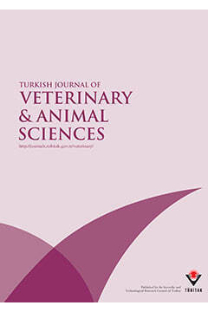The Prevalences of Helminth Species According to Faecal Examination in Equids in Different Cities in Turkey
The faeces of 464 horses and 110 donkeys were cOllected and examined by the flotation, sedimentation and Baermenn-Wetzel methods in a parasitology laboratory. The examinations showed that 327 of 464 (70.5%) horses and 85 of 110 (77.3%) donkeys were infected with the following species: in horses, Strongylidae sp. 62.7%, Strongyloides westeri 5.8%, Parascaris equorum 3.2%, Anoplocephalidae sp. 2.4 %, Fasciola hepatica 0.9%, Oxyuris equi 0.6%, and Paranoplocephala mamillana 0.2%; and in donkeys; Strongylidae sp. 72.7%, Strongyloides westeri 13.6%, Parascaris equorum 2.7%, Fasciola hepatica 0.9%, Oxyuris equi 0.9% and Dicrocoelium dendriticum 0.9%.
The Prevalences of Helminth Species According to Faecal Examination in Equids in Different Cities in Turkey
The faeces of 464 horses and 110 donkeys were cOllected and examined by the flotation, sedimentation and Baermenn-Wetzel methods in a parasitology laboratory. The examinations showed that 327 of 464 (70.5%) horses and 85 of 110 (77.3%) donkeys were infected with the following species: in horses, Strongylidae sp. 62.7%, Strongyloides westeri 5.8%, Parascaris equorum 3.2%, Anoplocephalidae sp. 2.4 %, Fasciola hepatica 0.9%, Oxyuris equi 0.6%, and Paranoplocephala mamillana 0.2%; and in donkeys; Strongylidae sp. 72.7%, Strongyloides westeri 13.6%, Parascaris equorum 2.7%, Fasciola hepatica 0.9%, Oxyuris equi 0.9% and Dicrocoelium dendriticum 0.9%.
- ISSN: 1300-0128
- Yayın Aralığı: Yılda 6 Sayı
- Yayıncı: TÜBİTAK
Sayıdaki Diğer Makaleler
A Survey of Bone Tumors in Dogs and Cats from 1986 to 2000 in Ankara
Detection of Critical Control Points in White Cheese Production in Small Dairy Plants
A Study on the Chromosomes of Konya Wild Sheep (Ovis orientalis spp.): Case Report
Namık Mevlüt ARAS, Özer AYIK, Esat Mahmut KOCAMAN, Telat YANIK
Karayaka ve Bafra (Sakız x Karayaka $G_1$) koyunlarda döl verimi, kuzularda yaşama gücü ve büyüme
Necmettin ÜNAL, Halil AKÇAPINAR, Metin ERDOĞAN, Fatih ATASOY
Engin ŞEKER, Mustafa SARIEYYÜPOĞLU, Burhan ÇETİNKAYA
Radiographic Evaluation of Pulmonary Pattern Changes in 27 Cats and 58 Dogs
